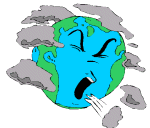
Air Pollution
 One of Earth's most important natural resources is its atmosphere. The atmosphere contains air without which plants and animals could not survive. It contains greenhouse gases which keep the planet naturally warmer than it would be otherwise, maintaining an average global temperature above freezing that allows water to exist in its liquid state, a necessary condition for most life. If mankind is to protect and preserve this unique natural resource for future generations as well as other ecosystems, it must continue to address the problem of air pollution which affects the atmosphere from the local to the global scale. Currently, there exist four major air pollution issues: air quality, acid rain, global warming and ozone depletion.
One of Earth's most important natural resources is its atmosphere. The atmosphere contains air without which plants and animals could not survive. It contains greenhouse gases which keep the planet naturally warmer than it would be otherwise, maintaining an average global temperature above freezing that allows water to exist in its liquid state, a necessary condition for most life. If mankind is to protect and preserve this unique natural resource for future generations as well as other ecosystems, it must continue to address the problem of air pollution which affects the atmosphere from the local to the global scale. Currently, there exist four major air pollution issues: air quality, acid rain, global warming and ozone depletion.
Air Pollution and concern about air quality are not new. Complaints were recorded in the 13th century when coal was first used in London. Since the middle of the 19th century, the atmosphere of the major British cities was regularly polluted by coal smoke in winter, giving rise to an infamous mixture of fog and smoke known as smog. Today the emphasis has shifted from the pollution problems caused by industry to the ones associated with motor vehicle emissions.
Acid rain is a widespread term used to describe all forms of acid precipitation such as rain and snow. Atmospheric pollutants, particularly oxides of sulphur and nitrogen, can cause precipitation to become more acidic when converted to sulphuric and nitric acids, hence the term acid rain. Acid deposition, acid rain and acid precipitation all relate to the chemistry of air pollution and moisture in the atmosphere. Scientists generally use the term acid deposition but all three terms relate to the same issue.
The Earth has warmed up by about 0.6°C in the last 100 years. During this period, man-made emissions of greenhouse gases have increased, largely as a result of the burning of fossil fuels and deforestation. In the last 20 years, concern has grown that these two phenomena are, at least in part, associated with each other. That is to say, global warming is now considered most probably to be due to the enhanced greenhouse effect.
The ozone layer filters out incoming radiation in the "cell-damaging" ultraviolet (UV) part of the spectrum. Without ozone, life on Earth would not have evolved the way it has. The discovery of a large ozone hole over Antarctica and its association with man-made CFCs led the world to take action to protect the ozone layer.
Agenda 21 calls for action in the energy production, transport and industrial sectors, to enhance energy efficiency and reduce emissions of air pollutants and greenhouse gases which cause air pollution.
Websites
Other topics
• UNEP
• UNEP Taking Action
• NSCA
• Environment Canada
• US EPA
• K8 Aeronautics
• Earth Day 2000
• Introduction
• Agenda 21
• Agriculture
• Air Pollution
• Biodiversity
• Biofuels
• Brundtland Report
• CHP
• Conservation/Preservation
• Cycling & Walking
• Doing Our Bit
• Earth Summit
• Energy
• Energy Efficiency
• Energy from Waste
• Forests
• Fossil Fuels
• Geothermal Energy
• Human Health
• Hydroelectric Power
• Indicators
• Land Use Planning
• Local Agenda 21
• Nuclear Power
• Population
• Poverty
• Power Generation
• Public Transport
• Renewable Energy
• Solar Energy
• Sustainable Development
• Tidal Power
• Transport
• Transport Impacts
• Transport Solutions
• UK Strategy
• Waste
• Waste Disposal
• Waste Recycling
• Water Quality
• Wave Power
• Wind Power
 Print Topic
Print Topic